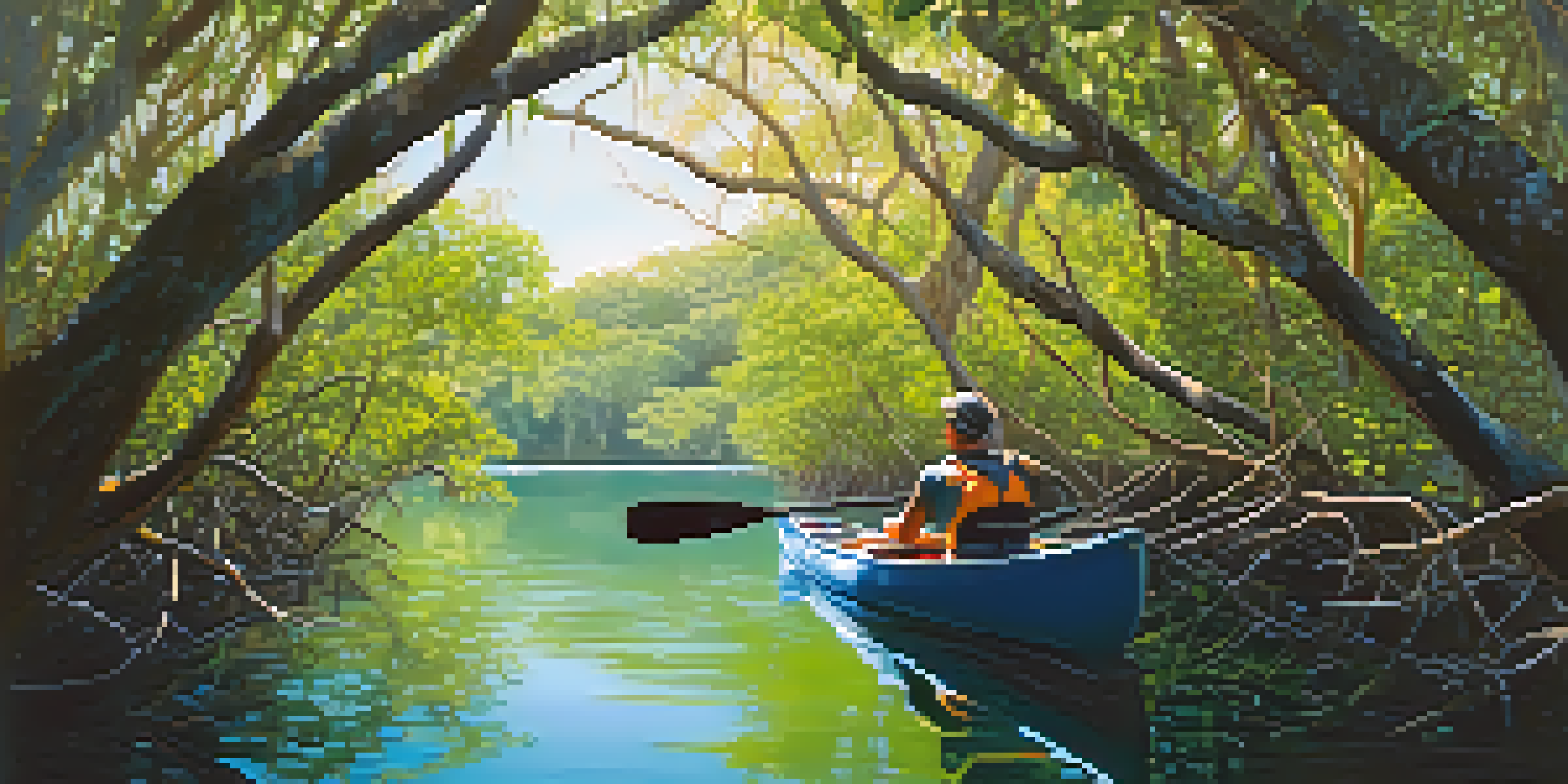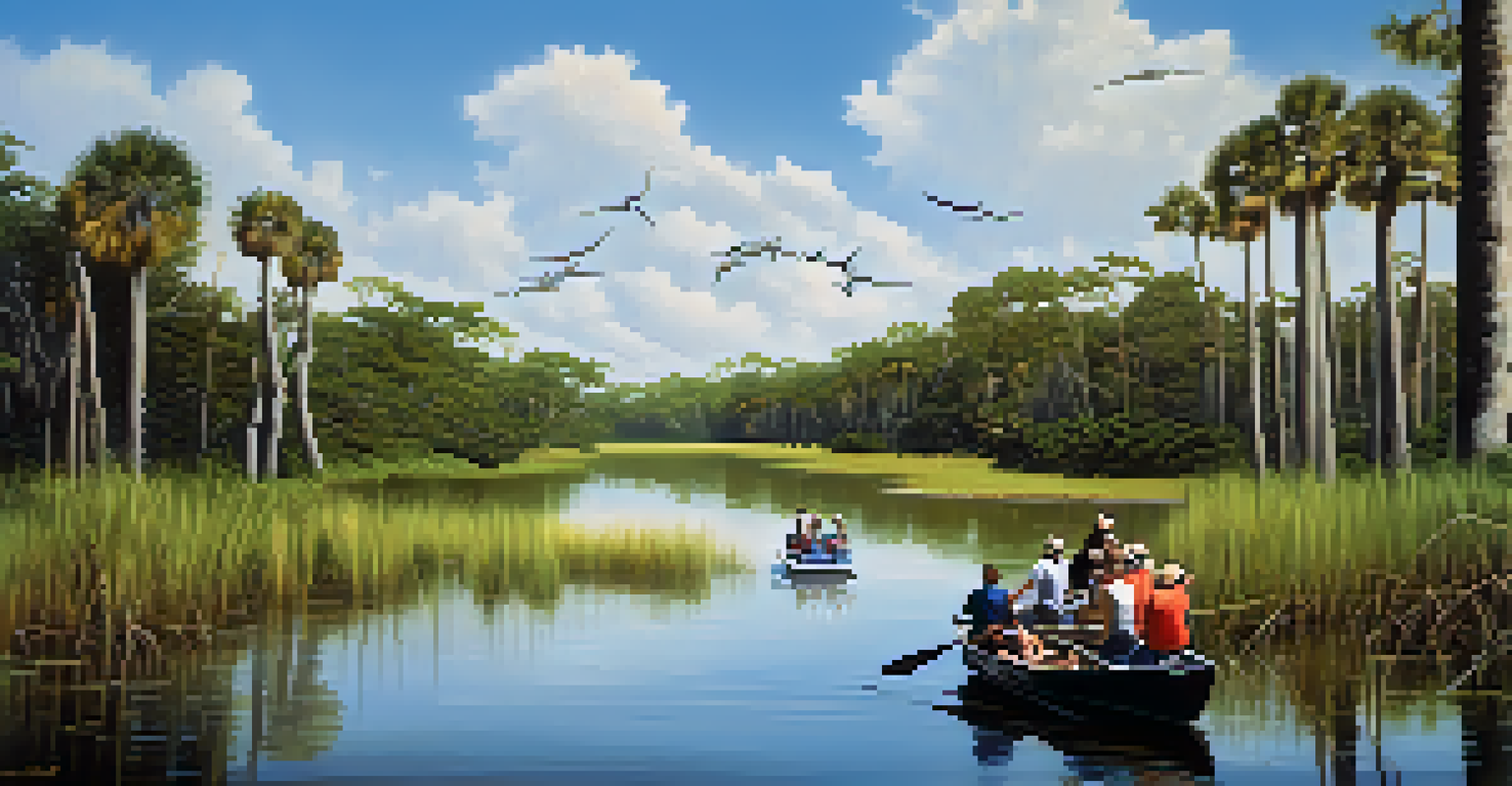Florida's Ecotourism: Sustainable Travel in Natural Spaces

Understanding Ecotourism and Its Importance
Ecotourism is a form of responsible travel that focuses on visiting natural areas while conserving the environment and improving the well-being of local communities. In Florida, where biodiversity thrives, ecotourism plays a vital role in promoting sustainability. By choosing ecotourism, travelers can enjoy the beauty of Florida's landscapes while supporting conservation efforts.
Ecotourism is a form of responsible travel that focuses on visiting natural areas while conserving the environment and improving the well-being of local communities.
The essence of ecotourism lies in creating a harmonious relationship between visitors and nature. It encourages tourists to engage with ecosystems in a way that minimizes their impact, preserving these precious environments for future generations. This approach not only enhances the travel experience but also fosters a deeper appreciation for nature.
Moreover, ecotourism often empowers local communities economically. When travelers visit natural spaces, they contribute to local businesses, from guided tours to eco-friendly accommodations, creating jobs and promoting cultural heritage. This economic boost is crucial for maintaining the delicate balance between tourism and conservation.
The Rich Biodiversity of Florida's Natural Spaces
Florida is renowned for its diverse ecosystems, ranging from lush forests to vibrant wetlands and pristine beaches. The state's unique geography supports a wide array of wildlife, including endangered species like the Florida panther and the manatee. Exploring these rich natural spaces offers an unparalleled opportunity for visitors to connect with nature.

One of the best ways to experience Florida's biodiversity is through its numerous state and national parks. Places like the Everglades National Park, a UNESCO World Heritage Site, provide exceptional opportunities for birdwatching, kayaking, and hiking. Each visit is a chance to witness the beauty of nature while learning about the importance of protecting these habitats.
Ecotourism Promotes Sustainability
Ecotourism fosters a responsible travel approach that conserves the environment while supporting local communities.
Additionally, Florida's coastal ecosystems, including coral reefs and mangroves, are crucial for sustaining marine life. Engaging in activities like snorkeling or diving not only showcases these underwater wonders but also raises awareness of the threats they face from climate change and pollution. By exploring these areas, travelers become advocates for marine conservation.
Popular Ecotourism Activities in Florida
There are countless ecotourism activities that allow visitors to immerse themselves in Florida's natural beauty. Birdwatching, for instance, is a favorite pastime for many, with Florida hosting a diverse range of bird species. Whether you're a seasoned birder or a curious beginner, the sights and sounds of Florida's avian life are mesmerizing.
The greatest threat to our planet is the belief that someone else will save it.
Kayaking through mangrove tunnels is another popular way to explore the state's unique ecosystems. Paddling quietly allows you to observe wildlife up close, from playful dolphins to majestic herons. Many local outfitters offer guided tours that educate participants on the importance of these habitats and the role they play in the environment.
For those looking to combine adventure with relaxation, eco-friendly lodging options abound. From treehouses to glamping sites, these accommodations often focus on sustainability, using renewable resources and minimizing waste. Staying in such places enhances the ecotourism experience by connecting you with the environment in a responsible way.
Supporting Local Communities through Ecotourism
Ecotourism is not just about enjoying nature; it also emphasizes supporting local communities. By engaging with local guides and businesses, travelers contribute directly to the economy. This connection fosters a sense of cultural exchange and enriches the travel experience, making it more meaningful.
Many ecotourism initiatives focus on preserving traditional ways of life while showcasing local culture. This can include participating in native cooking classes or learning about indigenous crafts. Such experiences not only provide insight into local customs but also promote cultural preservation.
Florida's Biodiversity Awaits
Exploring Florida's diverse ecosystems provides visitors with unique opportunities to connect with nature and advocate for conservation.
In addition, ecotourism helps communities develop sustainable practices that protect their environment. For example, local organizations may implement programs for wildlife conservation or habitat restoration, funded by tourism revenues. This creates a win-win situation, where both travelers and communities benefit.
The Role of Conservation in Ecotourism
Conservation is at the heart of ecotourism, ensuring that natural spaces remain intact for future generations. Many ecotourism operators prioritize sustainable practices, such as using renewable energy sources and reducing waste. This commitment to conservation helps mitigate the environmental impact of tourism.
Participating in conservation programs during your travels can enhance your ecotourism experience. Many organizations offer volunteer opportunities, allowing visitors to contribute to local initiatives, such as planting trees or cleaning up beaches. These hands-on experiences deepen your connection to the environment and can be incredibly rewarding.
As travelers become more aware of their impact, the demand for eco-friendly options continues to rise. This shift encourages more businesses to adopt sustainable practices, further promoting conservation. By choosing ecotourism, you become part of a growing movement that values the preservation of our planet.
Choosing Eco-Friendly Accommodations
Selecting eco-friendly accommodations is a crucial aspect of sustainable travel. Many hotels and lodges in Florida are designed with sustainability in mind, utilizing energy-efficient systems and eco-friendly materials. Staying in these places not only minimizes your carbon footprint but also supports businesses that prioritize the environment.
Look for accommodations that have received certifications, such as LEED (Leadership in Energy and Environmental Design) or Green Key. These certifications indicate that a property has met rigorous standards for sustainability. By choosing certified establishments, you can feel good about your impact on the environment.
Support Local Through Travel
Engaging with local businesses and culture enhances the travel experience while economically benefiting the communities visited.
Additionally, many eco-friendly hotels offer educational programs or activities that promote conservation. Guests might participate in workshops on local ecology or enjoy guided nature walks that highlight the importance of preserving Florida's natural beauty. This integration of education and travel creates a holistic ecotourism experience.
Planning Your Ecotourism Adventure in Florida
Planning an ecotourism trip to Florida can be both exciting and rewarding. Start by researching destinations that align with your interests, whether that's wildlife viewing, hiking, or water sports. Florida's diverse landscapes offer something for everyone, making it easy to find activities that resonate with you.
Consider the time of year you plan to visit, as different seasons can affect wildlife activity and weather conditions. Spring and fall are often ideal for outdoor adventures, with comfortable temperatures and vibrant natural displays. Be sure to check local calendars for events or festivals that celebrate Florida's ecology and culture.

Finally, don't forget to pack responsibly! Bring reusable water bottles, biodegradable toiletries, and any other eco-friendly products to minimize waste during your travels. By being mindful of your choices, you can contribute positively to the environment while enjoying all that Florida's natural spaces have to offer.